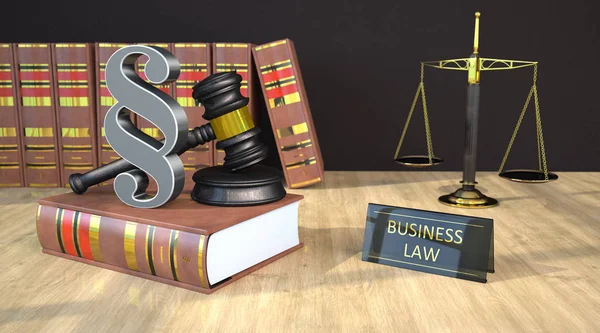Understanding the Role of a Business Lawyer
Business lawyers serve as invaluable guides through the intricate web of legal complexities that businesses face. Their role extends beyond mere legal advice; they become trusted partners, helping entrepreneurs and organizations make informed decisions to protect their interests. First and foremost, business lawyers are well-versed in various areas of law, including contracts, intellectual property, taxation, employment law, and more. They comprehensively understand how these legal aspects intersect with business operations.
Strategic Business Lawyer: You are for Success
Moreover, business lawyers bring strategic thinking to the table. They assess risks associated with different courses of action and help you navigate potential pitfalls before they become major obstacles. From negotiating agreements to handling disputes or mergers – their expertise lies in providing sound counsel explicitly tailored to your unique situation. With a skilled business lawyer by your side from the early stages of your entrepreneurial journey or throughout the lifespan of your organization, you can confidently forge ahead knowing that you have an advocate dedicated to safeguarding your best interests at every turn.
The Anatomy of an Effective Business Lawyer
An effective business lawyer is like a well-oiled machine, each component working seamlessly to protect your interests. First and foremost, they deeply understand the law and how it applies to your industry. They have honed their legal skills through years of experience, enabling them to navigate complex regulations and anticipate potential issues. In addition to legal expertise, an effective business lawyer brings strong communication skills. They listen attentively to your concerns and goals, ensuring every decision aligns with your best interests. They are also skilled negotiators who can advocate for you in any situation, whether drafting contracts or resolving disputes.
Litigation Versus Mediation: Business Lawyers’ Choices
Litigation versus mediation: two paths that business lawyers can take when resolving disputes. In legal battles, litigation is often seen as the more traditional and aggressive approach. It involves taking the debate to court, presenting arguments before a judge or jury, and waiting for a verdict. On the other hand, mediation offers a more collaborative and flexible alternative. With mediation, business lawyers act as facilitators in negotiations between parties involved in the dispute.
Business Lawyer Insights: Litigation vs. Mediation for Disputes
The choice between litigation and mediation depends on various factors, such as time constraints, cost considerations, and the nature of the dispute. Litigation may be necessary when complex legal issues are at stake or when one party refuses to cooperate. However, it can also be costly and time-consuming due to lengthy court processes. Mediation allows parties to find common ground through open dialogue with the assistance of their respective business lawyers. It allows for creative solutions that may not be possible within a courtroom setting.
Importance of Intellectual Property Protection
Intellectual property (IP) is a valuable asset for any business, regardless of size or industry. It encompasses ideas, inventions, designs, logos, and trade secrets that give a company its unique identity and competitive advantage in the marketplace. Protecting IP is crucial as it safeguards the fruits of innovation and creativity from unauthorized use or infringement by competitors. Intellectual property protection ensures that businesses have exclusive rights to their creations. This means they can prevent others from copying or using their ideas without permission.

Securing Intellectual Property: A Business Lawyer’s Guide
By safeguarding their IP assets through patents, trademarks, copyrights, and trade secrets, companies can maintain control over how their innovations are exploited in the market. Moreover, protecting intellectual property also helps businesses build trust with customers who associate certain qualities and reliability with a particular brand or product. In today’s fast-paced digital age, where information travels at lightning speed across various platforms worldwide – securing intellectual property becomes even more paramount for businesses.
Business Lawyers: Safeguarding Intellectual Property in the Digital Age
With the rise of online commerce and global markets interconnected through technology networks – IP infringements have become more common than ever before. Therefore, taking proactive steps to protect one’s intellectual property not only preserves a company’s reputation but also prevents financial losses arising from counterfeit products or unfair competition. By emphasizing the importance of IP protection within an organization’s overall strategy – business lawyers play a vital role in helping clients understand regulatory frameworks and develop comprehensive plans to safeguard their intangible assets effectively.
How Business Lawyers Protect Intellectual Property
Business lawyers safeguard your intellectual property (IP) from infringement and unauthorized use. They understand the intricacies of IP laws and know how to navigate through the legal landscape to protect your valuable assets. Business lawyers help by conducting thorough research to ensure your IP is unique and not already claimed by others. They can assist in filing for patents, trademarks, or copyrights, ensuring you have exclusive rights over your creations. Additionally, they guide licensing agreements and contracts to control who can use your IP and under what conditions.
Defending Your Creativity: Business Lawyers in IP Disputes
Furthermore, business lawyers represent you should any disputes arise regarding the misuse or infringement of your IP rights. They can initiate legal action against infringers, seeking compensation for damages caused. Their expertise allows them to negotiate settlements or resolutions outside court whenever possible – saving you time and money. Hiring a business lawyer is essential for protecting your intellectual property rights effectively. With their knowledge of IP laws and strategies for enforcement, they act as guardians of creativity and innovation in the business world.
Legal Strategies for Intellectual Property Protection
When safeguarding your intellectual property, having a solid legal strategy is crucial. Business lawyers play a vital role in helping you develop effective strategies to protect your valuable assets. One critical method is to file for patents, trademarks, and copyrights. These legal protections grant you exclusive rights to use and profit from your inventions, brand names, logos, and creative works. Additionally, business lawyers can help you monitor and enforce these rights by conducting regular searches for potential infringements and taking appropriate legal action when necessary.
Confidentiality and IP Protection: Business Lawyers’ Role in NDAs
Another important aspect of intellectual property protection is maintaining confidentiality through non-disclosure agreements (NDAs). You can prevent unauthorized disclosure or use of such valuable knowledge by using NDAs with employees, contractors, suppliers, or any other party who may have access to sensitive information about your innovations or trade secrets. A comprehensive legal strategy explicitly tailored to your intellectual property needs is essential for protecting your competitive advantage in the marketplace. With their expertise in IP law and experience in handling complex cases involving infringement disputes or licensing agreements,

Drafting and Negotiating Contracts and Agreements
Drafting and negotiating contracts and agreements is crucial to protecting your intellectual property. A skilled business lawyer understands the intricacies of crafting legally binding documents safeguarding your rights. They are well-versed in the language of contracts. They can ensure that all necessary provisions, such as confidentiality or non-disclosure agreements, are included to protect your valuable IP.
How Business Lawyers Protect Your Interests
Moreover, a business lawyer can expertly negotiate with other parties to ensure your interests are represented and protected. They have a keen eye for detail and can identify potential risks or loopholes that may arise during negotiations. Having a knowledgeable legal professional by your side makes you feel confident knowing that every contractual agreement is thoroughly reviewed, negotiated if needed, and drafted to secure your intellectual property rights.
Legal Tech Trends: Empowering Business Lawyers
The legal industry is not immune to the advancements in technology. It has embraced them wholeheartedly. Legal tech trends are revolutionizing how business lawyers practice law and protect their clients’ interests. One of the key areas where legal tech has significantly impacted is streamlining processes and improving efficiency. With the help of cutting-edge software and tools, business lawyers can now automate mundane tasks such as document review, contract management, and case research. This frees up their time to focus on more strategic aspects of their work, such as advising clients on complex legal matters and developing innovative solutions.
Tech-Enhanced Collaboration: Business Lawyers’ Path to Efficiency
Furthermore, technology has also facilitated seamless collaboration between lawyers and their clients. With secure online portals and communication platforms, businesses can easily share sensitive information with their legal counsel while maintaining confidentiality. This not only enhances client-lawyer relationships but also expedites decision-making processes. By harnessing the power of legal tech trends, business lawyers can become more productive and provide better services to their clients. As technology evolves rapidly, it will be interesting to see how it further empowers these professionals to shape the law’s future

Conducting Intellectual Property Audits
Protecting intellectual property is critical for businesses in today’s highly competitive marketplace. One effective way that business lawyers can help safeguard your valuable IP assets is by conducting intellectual property audits. During an IP audit, the lawyer will thoroughly review your company’s intellectual property portfolio. This includes trademarks, copyrights, patents, trade secrets, and other proprietary information. The goal is to identify potential vulnerabilities and protect your IP rights.

Safeguarding Your Innovations: The Role of Business Lawyers
Remember to consider the importance of protecting your company’s intellectual property! Infringement or theft can have severe financial consequences and damage your brand reputation. Conducting regular IP audits with the assistance of a knowledgeable business lawyer ensures that you remain proactive in preserving the value and integrity of your unique ideas and innovations. Stay tuned for our next blog section, “The Ethics of Business Law: A Lawyer’s Perspective.”
The Ethics of Business Law: A Lawyer’s Perspective
As a business lawyer, upholding ethical standards is essential in serving clients and protecting their interests. Operating within a robust ethical framework ensures fairness, integrity, and trust in the legal profession. Ethics are crucial in business law, from maintaining client confidentiality to providing honest advice. One critical ethical consideration for lawyers is conflicts of interest. It’s vital to avoid situations where personal or financial relationships could compromise impartiality or loyalty to clients.
The Role of Business Lawyers in Corporate Integrity
Transparency and disclosure are paramount when identifying potential conflicts and taking steps to prevent harm or bias. Additionally, professional responsibility includes clear communication with clients about fees, expectations, and possible outcomes. Lawyers must provide accurate information while avoiding misleading statements or promises they can’t deliver on. Upholding these ethical principles maintains trust and ensures business lawyers advocate for justice and fairness in the corporate world.
Recent Developments in Intellectual Property Law
In the ever-evolving world of intellectual property law, staying up to date with recent developments is crucial for businesses and their lawyers. These changes can significantly impact how intellectual property is protected, enforced, and monetized. One notable development is the rise of artificial intelligence (AI) in intellectual property management. AI technology now plays a vital role in streamlining patent searches, trademark monitoring, and copyright infringement detection. With its ability to analyze vast amounts of data quickly and efficiently, AI empowers business lawyers to provide more accurate advice and protect their clients’ intellectual assets.
Guardians of the Digital Realm: Business Lawyers in IP Protection
Another significant development is the increased focus on protecting digital content. Online piracy and unauthorized use of copyrighted materials have become considerable business concerns as technology advances rapidly. In response, lawmakers are updating regulations around digital rights management (DRM) and implementing stricter penalties for copyright infringement online. By keeping abreast of these recent developments in intellectual property law, business lawyers can better serve their client’s interests by adapting strategies that align with current legal trends while safeguarding their valuable intangible assets.
Frequently Asked Questions about Business Lawyers and Intellectual Property Protection
H2: As we wrap up this discussion on how business lawyers can help protect your intellectual property, let’s address some frequently asked questions that may be lingering in your mind:
1. Do I need a business lawyer to protect my intellectual property?
While having a business lawyer is not legally required, their expertise can be invaluable in safeguarding your intellectual property. From filing patents and trademarks to drafting ironclad contracts, they are well-versed in the intricacies of IP protection.
2. How do I choose the right business lawyer for my needs?
Finding the right business lawyer requires careful consideration. Look for professionals with experience in intellectual property law who understand your industry. Seek recommendations from trusted sources or consult legal directories and professional associations.
3. Can a business lawyer help me if someone infringes upon my intellectual property rights?
Absolutely! If you face infringement issues or theft of your ideas, a skilled business lawyer can guide you through enforcing your rights and seeking appropriate remedies.
4. Are there any alternatives to litigation when resolving disputes over intellectual property?
Yes, alternatives such as mediation or arbitration offer quicker and more cost-effective solutions than going to court. A knowledgeable business lawyer will assess which option best protects your interests while minimizing conflict.
5. How often should I conduct an intellectual property audit?
Regularly conducting an IP audit is crucial to identify potential risks and ensure ongoing protection of your valuable assets. It is recommended that businesses review their IP portfolio annually or whenever significant changes occur within the organization.
